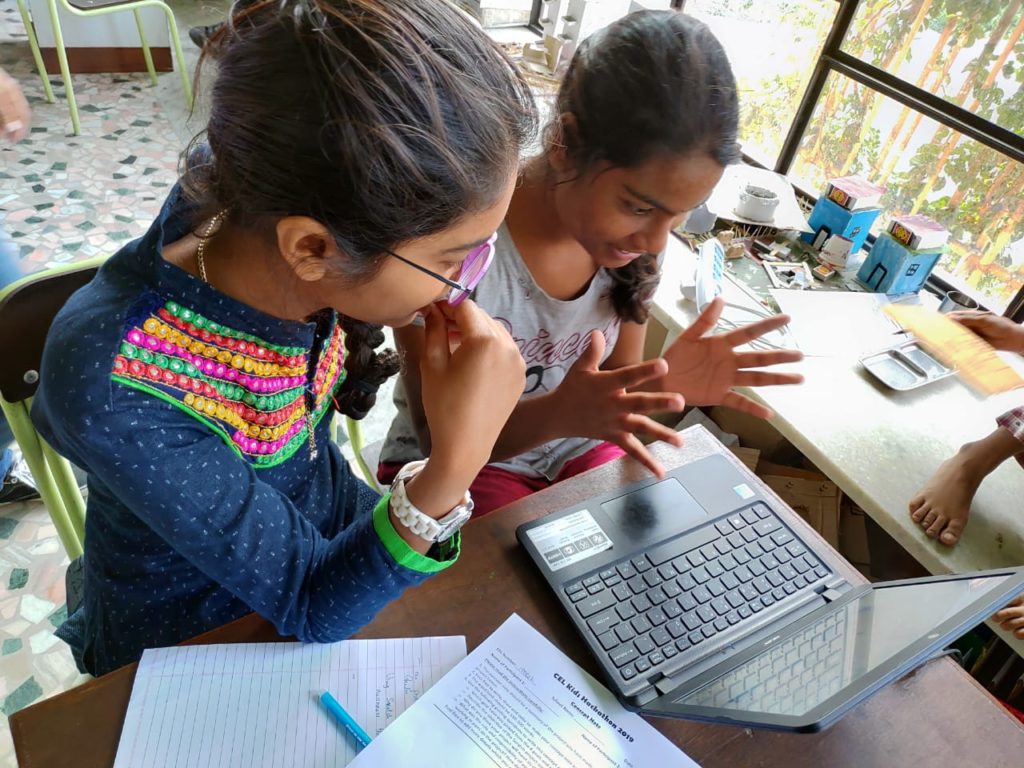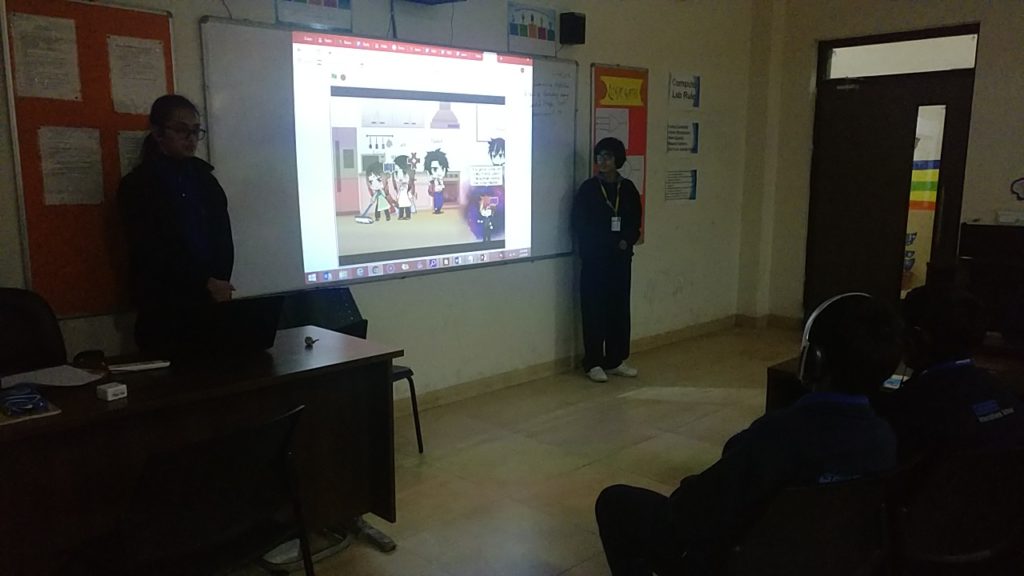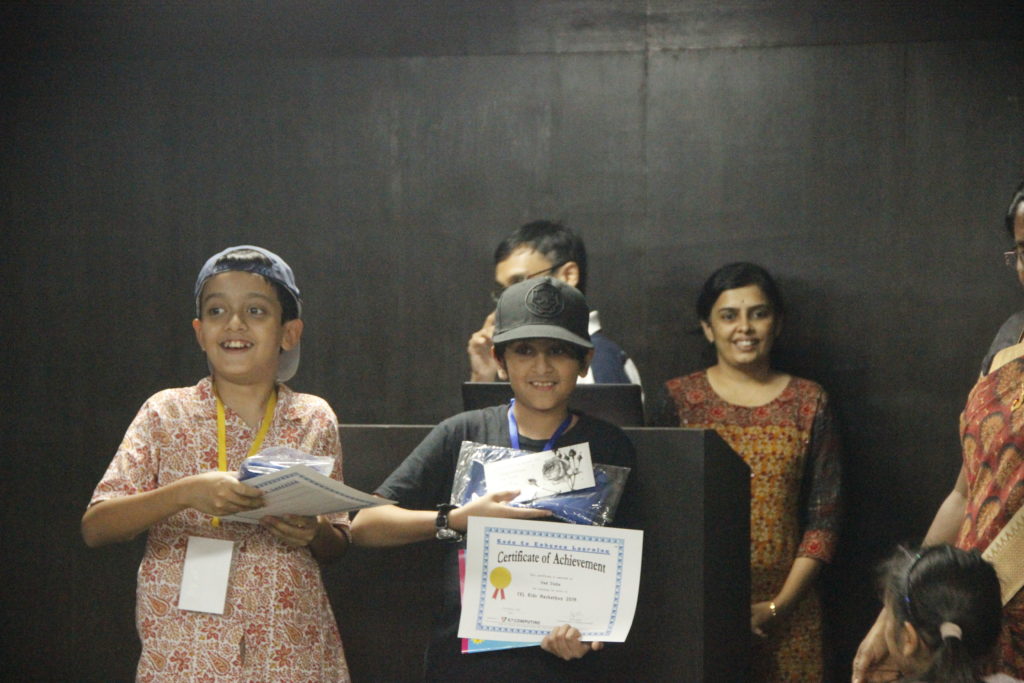A sneak peek into the CEL Kids Hackathon 2019

Five years back, I started teaching coding in low income resource schools seeing the amount of thinking and creativity it builds in kids besides learn a language relevant to this century which can help them create technology based solutions. 10 of my students got a chance to present in front of a team from Apple which came to our school. While they were presenting, the team asked them couple of questions and to my surprise they were confidently able to answer. Students were so overjoyed with the presentation and were smiling ears to ears and became excited to learn more (similar to the picture in line below after one of the coding sessions we had in our partner school). That day, I learnt that to be life-long learners it’s important for kids to showcase their learning.
In the last five years, as I have grown as educator, I have failed-learned-reinvented a number of initiatives where I have created lesson plans and shared with teachers, published a book, facilitated free coding workshops for children and teachers, created videos lessons, worked with organizations/schools to create curriculum and implement coding and even registered a non-profit.
An article, 10 Ways Competition Enhance Learning, by Josh Neubert on the website of Competition of Institute Science Josh breaks the common misunderstanding about competition and describes benefits of it with research back impact. I understood that competition conducted in safe and collaborative environment could lead to so many benefits and learning which are very essential in our current world.
With CEL Kids Hackathon, the idea is simple to bring back my learning of giving kids in India a chance to showcase their coding talent to a larger audience, appreciate their work, make them feel overjoyed and inspire them to be life-long learners.
CEL kids Hackathon, a collaborative coding event to help kids showcase their coding talent. This year 1000+ children participated in CEL Kids Hackathon 2019 from 50+ schools (government, low income and international) across 8+ cities in India. Students were give a problem statement where they had to code animations, games and applications to spread awareness about the UN Sustainable Development Goals in context with their surroundings.
Few important things that we have focused in the CEL Hackathon consciously are as follows,
- Relevance in projects!
- Collaboration among students and teacher
- Showcase opportunities for all
- Celebrating everyone’s participating and creation
- Feedback on each and every criteria highlighting the strengths and areas of development
- Diversity in registrations
- Flexibility to suit needs of as many as possible
- Support to help children and schools showcase their best

These are from experience and conversations I have had with multiple educators who are passionate and have worked in sector for a decade. Recently, I read a case study EFFECTS OF COMPETITION IN EDUCATION: A CASE STUDY IN AN E-LEARNING ENVIRONMENT by Iván Cantador, José M. Conde Departamento de Ingeniería Informática Universidad Autónoma de Madrid Campus de Cantoblanco, 28049 Madrid, Spain which analyses the effects of competition in education and identifies the benefits and drawbacks of forcing students to compete themselves during their learning process, and investigate a number of features a competitive learning activity should have in order to motivate students, and improve their academic performance. I was happy to see that the features of CEL Kids Hackthon 2019 were alignment with the features mentioned in the case study to motivate students to perform better.

Kids of age 10 have made amazing things to not only spread awareness about UN goals like No Poverty, Gender Equity, Climate Action, etc. but also have made games in fun way to make people learn about the steps they can take to progress towards the goal. For example, one of the teams has made a game like Sim City (a popular mobile game) to spread awareness about climate action. In the game, the user’s happiness and hunger level keeps decreasing. The users have to buy things on day to day basis to keep themselves happy so as to avoid depression and stress and keep themselves healthy. In doing so, there is waste generated so the game lets users decide what they should do with the wastes that are generated on day to day basis. In the process of playing game, the users learn about the types of wastes which they are supposed to recycle, compost or throw. There are many applications like this which the kids have coded in the CEL KIds Hackathon 2019.

In my experience, the usual education process is about scoring marks, rote learning things, getting jobs, earning unimaginable amount of money and having a luxurious life. However, with CEL Kids Hackathon 2019, one shift I saw was that children researched about the problems in their surroundings, found creative solutions, coded projects and the whole education process was focused towards achieving the UN’s Sustainable development Goals to make our world a better place.
As per research of Aspiring minds, less 5 percentage of engineers passing out of college are able to write basic logical codes which is a basic requirement of a job in India. One of the major reasons for this is that kids don’t get to code in schools and explore the beauty of it. There is challenge of curriculum, expertise, infrastructure, etc, which stops kids from coding.
Coding in 21st century is a great skill to have because of the digital revolution. It is more valuable in India as we have diversified huge market which required scalable and customizable solutions like Oyo, Uber, Facebook. This is possible using technology and in order to leverage technology we need people who can talk with computers in a language computer can understand. Coding is art of telling computer things it is supposed to do.
I believe that kids learning coding from young age (Bill Gates started at 10, I guess) can be leaders bring out huge technology based revolutions in India finding solutions to problems and making our life easy.

In 2020, our vision is reaching out 3000 children from 10+ cities from government school, low income and high income and would love if we are able to inspire more girls and give them equitable opportunities so that they are able to secure a place in top 6 winners.
Irfan Lalani


